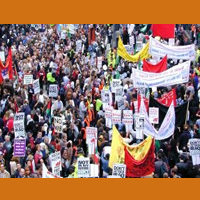PROPOSITIONS
CONTENTS OF WEBSITE AND PUBLICATIONS IN TEN PROPOSITIONS
The ideas presented in the publications and on this site can be summarized in the following ten propositions:
1. To ensure the wellbeing of present and future generations we need an ecologically sustainable, socially equitable and prosperous society. This requires a transition process that is best indicated with the term sustainable development.
2. There are two key obstacles to sustainable development: mainstream economics and our monetary system. Mainstream economics is a failed science. Its dominant method, mathematical modeling, is based on unrealistic assumptions, creating a distorted image of economy reality.
3. At the core of economics are dogmas which, although never tested against reality, are accepted as timeless universal truths. Those dogma’s determine economic, fiscal and monetary policy and thus government policy overall in ways that block sustainable development.
4. The single most important obstacle to sustainable development is our current monetary system, in which the right to create money has been ceded to commercial banks. As banks create money only when providing credit almost our entire money supply is debt-based.
5. Ceding the right to create money to private banks deprives the State from the possibility to garner society’s productive capacity to address its ecological, social and economic challenges, because it deprives the State of the resources to do so.
6. In our present system the State depends mostly on taxes to finance its activities. Private banks create money only for consumption and short term investments for the private good, not for long term public investment. The State must reclaim the right to create money, both because managing this essential service is a public responsibility and because it would allow creating non-debt money for long term investment in sustainable development.
7. Economic dogma holds that only markets ensure an optimal balance between supply, demand and the money supply. Therefore mainstream economists oppose transferring the privilege to create money – the right of seigniorage – to the State. This deprives society of the option to create debt free money for the public good, thus blocking long-term investment in sustainable development.
8. To really understand how the economy works and to resolve the present stalemate and paralysis in effectively tackling society’s environmental, social and economic challenges will require economic science to be rebuilt from the bottom up. Real change is possible only if academic economists and more important, policy and opinion makers claiming to be economically literate can be weaned from their adherence to the dogmas of present day economics.
9. All concerned about the fate of society and humanity should push for a an overhaul of economics as well as the transition to a public monetary system, so as to allow the State to garner society’s productive capacity for sustainable development.
10. The lead in calling for the overhaul of economics and our monetary system should be taken by those economists who recognize the shortcomings of their profession, other social scientists, and above all natural scientists and technology developers. It is this latter group that can rightfully claim the credit for the growth of wealth and wellbeing over the past century, has created or is creating the tools for sustainable development, but see their use blocked by misconceived economic dogma.



